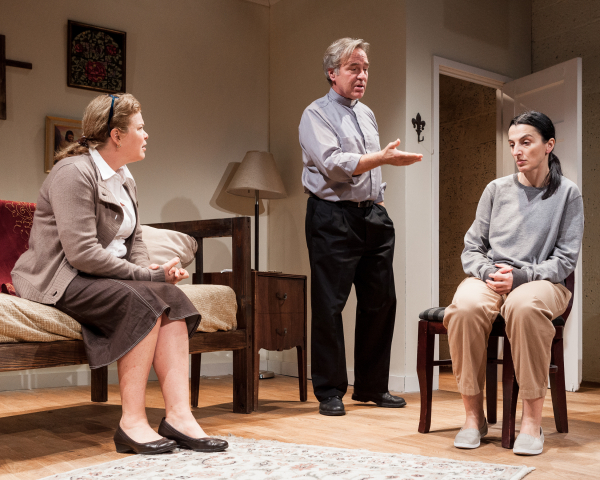Cloven Tongues

(© Zachary Tyler Newton)
It has been said that the ability to deny reality is one of the reasons our species has survived as long as it has. Denial is a survival mechanism that helps humans go on. That could well be the epigraph for Cloven Tongues, a new play by Victor Lesniewski now being staged at The Wild Project. The production, directed by Michelle Bossy, examines the life of a troubled woman torn apart by war and sexual abuse, but gets sidetracked by the stories of the two people who try to heal her.
Cloven Tongues focuses on Lela (Ema Laković), a laconic Bosnian woman who has been brought to St. Marks, a halfway house in upstate New York, after being arrested in Canada. She finds herself under the care of a priest, Father Ronald (Casey Biggs), and a social worker, Jenny (sensitively portrayed by Catherine Curtain). Ronald longs for a miracle from God that will reveal his vocation to him in no uncertain terms, and Jenny has a guilty memory that she needs to exorcise. Lela becomes the locus of their attention, in part because they want to help her, but also because they want to fill voids in their own lives.
Though reluctant to speak at first, Lela takes comfort in the romantic attentions of grocery deliverer Paul (charmingly played by Alex Mickiewicz), who blandishes her with praise for all the horrible things she has heroically endured. Ronald is convinced that what Lela really needs is prayer, but since she is an atheist, religion is a tough sell. Still, Lela is willing to suppress her disbelief if it will make her feel healthy again. Then in an intense prayer session, Lela lets go a torrent of words, in her native Bosnian tongue, revealing the horrors she endured in her country — and in a moment of extreme ecstasy, Ronald too speaks to Lela in Bosnian, a language that he claims is foreign to him. The "miracle" of Ronald's spontaneous outburst, the speaking in tongues that the play's title alludes to, remains a mystery.
But the mystery of Lela's past is soon revealed. In a series of short scenes each begun and ended with a thunderous explosion of bombs, we learn about Lela's appalling history in war-torn Bosnia and the three people who impacted her life there. We witness the execution of her brother, Dino (Mickiewicz), and the woman, Anka (also Curtin), who turned him in. We meet the soldier Julian (also Biggs) who wooed Lela before she was forced into the sex trade, which compelled her to make one choice every day: be raped or be killed. These past acquaintances sometimes merge in Lela's mind with the people in her present in this scenic pastiche. In one clever scene, Julian becomes Father Ronald (one of Biggs' memorable moments). The remainder of the play shows us the unraveling of Lela's distraught mind and the destruction of Ronald's and Jenny's delusions about the efficacy of religion and rehabilitation, and about their own supposedly selfless motives for helping others.
Cloven Tongues tackles these heavy topics and its characters' stories energetically, but it gets lost in its own ambition. Bossy's direction of Lela's initial outburst in Bosnian is breathtaking, as we see the tortured woman's words explode in English on the rear wall of the set. And the set (designed by Heather Freedman, with haunting lighting by Nicholas Houfek) lends itself to quick and dramatic scene changes from the rooms at St. Mark's to young Lela's apartment in Bosnia.
However, the play itself attempts to do too much with too many characters. Despite the fact that we learn a lot about Lela, her story feels incomplete (unlike Sophie Zawistowski's harrowing tale in the film Sophie's Choice, which comes to mind while watching Cloven Tongues). Is the play about Lela after all? The priest and the social worker have their own character arcs that require closure. Ronald's and Jenny's stories, which could make interesting plays of their own, are shoehorned late in the game, after all our emotional energy has been directed at Lela. Ronald hasn't explored his sense of inadequacy as a priest and his hidden suspicion that all his praying doesn't do much good, and Jenny hasn't dealt with her compulsion to build shelters around everyone she cares for to avoid the tragedy that her negligence caused in the past, not to mention her case of unrequited love. These stories need an audience, too, but they don't get one. As a result, none of the characters' narratives satisfies completely.
But what does satisfy is Laković's performance. She brings a dark, tortured intensity to Lela's character, so intense that when she smiles, one actually feels a sense of relief, as though all storms have passed. But this play never sails calm seas, and the lifeboats sink one by one. Despite its faults, Cloven Tongues raises interesting questions about the lies we tell ourselves in order to survive and about what can happen when we let the lies go.











